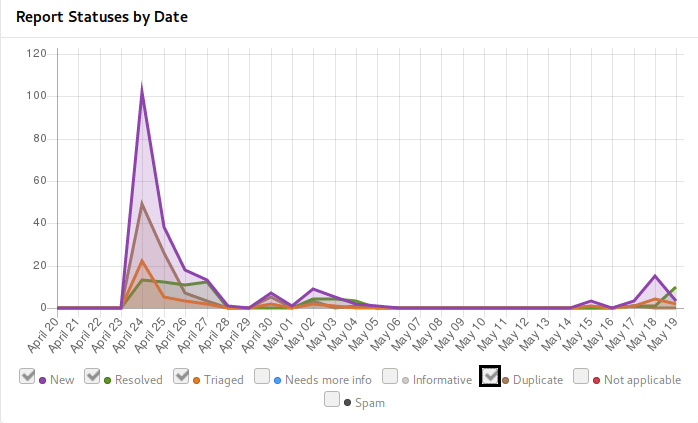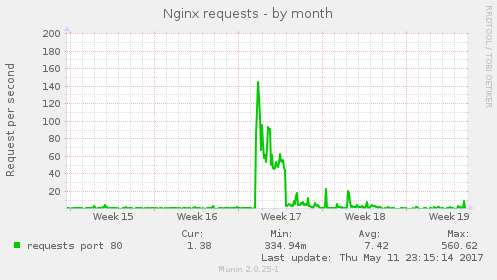
During last week I've noticed several interesting posts about challenges being free software maintainer. After being active in open source for 16 years I can share much of the feelings I've read and I can also share my dealings with the things.
First of all let me link some of the other posts on the topic:
I guess everybody involved in in some popular free software project knows it - there is much more work to be done than people behind the project can handle. It really doesn't matter it those are bug reports, support requests, new features or technical debt, it's simply too much of that. If you are the only one behind the project it can feel even more pressing.
There can be several approaches how to deal with that, but you have to choose what you prefer and what is going to work for you and your project. I've used all of the below mentioned approaches on some of the projects, but I don't think there is a silver bullet.
Finding more people
Obviously if you can not cope with the work, let's find more people to do the work. Unfortunately it's not that easy. Sometimes people come by, contribute few patches, but it's not that easy to turn them into regular contributor. You should encourage them to stay and to care about the part of the project they have touched.
You can try to attract completely new contributors through programs as
Google Summer of Code (GSoC) or
Outreachy, but that has it's own challenges as well.
With
phpMyAdmin we're participating regularly in GSoC (we've only missed last year as we were not chosen by Google that year) and it indeed helps to bring new people on the board. Many of them even stay around your project (currently 3 of 5
phpMyAdmin team members are former GSoC students). But I think this approach really works only for bigger organizations.
You can also motivate people by money. It's way which is not really much used on free software projects, partly because lack of funding (I'll get to that later) and partly because it doesn't necessarily bring long time contributors, just cash hunters. I've been using
Bountysource for some of my projects (Weblate and Gammu) and so far it mostly works other way around - if somebody posts bounty on the issue, it means it's quite important for him to get that fixed, so I use that as indication for myself. On attracting new developers it never really worked well, even when I've tried to post bounties to some easy to fix issues, where newbies could learn our code base and get paid for that. These issues stayed opened for months and in the end I've fixed them myself because they annoyed me.
Don't care too much
I think this is most important aspect - you simply can never fix all the problems. Let's face it and work according to that. There can be various levels of don't caring. I find it always better to try to encourage people to fix their problem, but you can't expect big success rate in that, so you might find it not worth of the time.
What I currently do:
- I often ignore direct emails asking for fixing something. The project has public issue tracker on purpose. Once you solve the issue there others will have chance to find it when they face similar problem. Solving things privately in mails will probably make you look at similar problems again and again.
- I try to batch process things. It is really easier to get focused when you work on one project and do not switch contexts. This means people will have to wait until you get to their request, but it also means that you will be able to deal them much more effectively. This is why Free hosting requests for Hosted Weblate get processed once in a month.
- I don't care about number of unread mails, notifications or whatever. Or actually I try to not get much of these at all. This is really related to above, I might to some things once in a month (or even less) and that's still okay. Maybe you're just getting notifications for things you really don't need to get notified on? Do you really need notification for new issues? Isn't it better just to look at the issue tracker once in a time than constantly feeling the pressure of not read notifications?
- I don't have to fix every problem. When it seems like something what could be as well fixed by the reporter, I just try to give them guidance how to dig deeper into the issue. Obviously this can't work for all cases, but getting more people on board always helps.
- I try to focus on things which can save time in future. Many issues turn out to be just some unclear things and once you figure out that, spend few more minutes to improve your documentation to cover that. It's quite likely that this will save your time in future.
If you still can't handle that, you should consider abandoning the project as well. Does it bring something to you other than frustration of not completed work? I know it can be hard decision, in the end it is your child, but sometimes it's the best think you can do.
Get paid to do the work
Are you doing your fulltime job and then work on free software on nights or weekends? It can probably work for some time, but unless you find some way to make these two match, you will lack free time to relax and spend with friends or family. There are several options to make these work together.
You can find job where doing free software will be natural part of it. This worked for me pretty well at
SUSE, but I'm sure there are more companies where it will work. It can happen that the job will not cover all your free software activities, but this still helps.
You can also make your project to become your employer. This can be sometimes challenging to make volunteers and paid contractors to work on one project, but I think this can be handled. Such setup currently works currently quite well for phpMyAdmin (we will announce second contractor soon) and works quite well for me with
Weblate as well.
Funding free software projects
Once your project is well funded, you can fix many problems by money. You can pay yourself to do the work, hire additional developers, get better infrastructure or travel to conferences to spread word about it. But the question is how to get to the point of being well funded.
There are several crowdfunding platforms which can help you with that (
Liberapay,
Bountysource salt,
Gratipay or
Snowdrift to mention some). You can also administer the funding yourself or using some legal entity such as
Software Freedom Conservancy which handles this for phpMyAdmin.
But the most important thing is to persuade people and companies to give back. You know there are lot of companies relying on your project, but how to make them fund the project? I really don't know, I still struggle with this as I don't want to be too pushy in asking for money, but I'd really like to see them to give back.
What kind of works is giving your sponsors logo / link placement on your website. If your website is well ranked, you can expect to get quite a lot of SEO sponsors and the question is where to draw a line what you still find acceptable. Obviously the most willing to pay companies will have nothing to do with what you do and they just want to get the link. The industry you can expect is porn, gambling, binary options and various MFA sites. You will get some legitimate sponsors related to your project as well. We felt we've gone too far with phpMyAdmin last year and we've stricten the rules recently, but the outcome is still not visible on our website (as we've just limited new sponsors, but existing contracts will be honored).
Another option is to monetize your project more directly. You can offer consulting services or provide it as a service (this is what I currently do with
Weblate). It really depends on the product if you can build customer base on that or not, but certainly this is not something what would work well for all projects.
Thanks for reading this and I hope it's not too chaotic, as I've moved parts there and back while writing and I'm afraid it got too long in the end.
Filed under:
Debian
English
Gammu
phpMyAdmin
SUSE
Weblate
0 comments
 It has been few months since I'm providing Windows binaries for Gammu, but other parts of the family were still missing. Today, I'm adding python-gammu.
Unlike previous attempts which used crosscompilation on Linux using Wine, this is also based on AppVeyor. Still I don't have to touch Windows to do that, what is nice :-). This has been introducted in python-gammu 2.9 and depend on Gammu 1.38.4.
What is good on this is that
It has been few months since I'm providing Windows binaries for Gammu, but other parts of the family were still missing. Today, I'm adding python-gammu.
Unlike previous attempts which used crosscompilation on Linux using Wine, this is also based on AppVeyor. Still I don't have to touch Windows to do that, what is nice :-). This has been introducted in python-gammu 2.9 and depend on Gammu 1.38.4.
What is good on this is that  I was surprised that they didn't lie - you will really get huge amount of issues just after making your project public. Most of them were quite simple and repeating (as you can see from number of duplicates), but it really provided valuable input.
Even more surprisingly there was second peak coming in when I've started to disclose resolved issues (once
I was surprised that they didn't lie - you will really get huge amount of issues just after making your project public. Most of them were quite simple and repeating (as you can see from number of duplicates), but it really provided valuable input.
Even more surprisingly there was second peak coming in when I've started to disclose resolved issues (once  I'm really glad I could make
I'm really glad I could make 
 But the most important part for me was where users want to see improvements. This somehow matches my expectation that we really should improve the user interface.
But the most important part for me was where users want to see improvements. This somehow matches my expectation that we really should improve the user interface.
 We have quite a lot features, which are really hidden in the user interface. Also interface for some of the features is far from being intuitive. This all probably comes from the fact that we really don't have anybody experienced with creating user interfaces right now. It's time to find somebody who will help us. In case you are able to help or know somebody who might be interested in helping, please
We have quite a lot features, which are really hidden in the user interface. Also interface for some of the features is far from being intuitive. This all probably comes from the fact that we really don't have anybody experienced with creating user interfaces right now. It's time to find somebody who will help us. In case you are able to help or know somebody who might be interested in helping, please